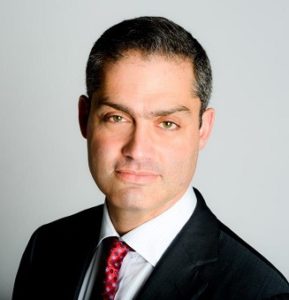 James Rubin, Former Director of State Operations for New York’s Governor, joined Meridiam as North America CEO in January 2018.
James Rubin, Former Director of State Operations for New York’s Governor, joined Meridiam as North America CEO in January 2018.
From May 2015 until January 2017, James was Commissioner of NYS Homes and Community Renewal (HCR), the agency that finances the development and preservation of affordable housing statewide. Before that, James headed the Governor’s Office of Storm Recovery (GOSR) where he served as the founding Executive Director, overseeing and creating programs to disburse USD 4.4 billion in disaster recovery funds allocated by the U.S. Department of Housing and Urban Development (HUD).
Prior to being tapped to lead GOSR, James was New York Director of the US President’s Hurricane Sandy Recovery and Rebuilding Task Force and a Senior Advisor to then-HUD Secretary Shaun Donovan. James was previously a Non-Resident Senior Fellow with the Brookings Institution Metropolitan Policy Program.
Communication is Key to Private Infra Investment
You can’t just show up and say, “I want to buy or invest in a bridge” and then it gets done. It just doesn’t work that way. Governments, with all the goodwill in the world, can try to get it done, but complicated big transactions take a long time to negotiate and governments change over, politics change, people lose interest. The private sector and the public sector, government, don’t speak the same language. Just like anybody else trying to do business when they don’t speak the same language, you need more interpreters, you need better interpreters in a place to meet the middle.
Major P3 Projects: Successes and Failures
New York City and New York State regulated affordable housing, except for the public housing, was all built as a result of public-private partnerships. Decades ago the government just decided that it didn’t make any sense to publicly build all of the housing that low-income people should live in. They invented all these financial tools to bring private money in and now there’s a developer community all over the place that builds housing for people who don’t make a lot of money. It’s helped out by the government, the government’s involved, but it’s a public-private partnership. It works great. People just don’t think about it that way but that’s been, in my mind, the most successful public-private partnership that we know of.
How Meridiam Works: Organizing Teams and Assuming Risk
The really critical piece of all of this is that if there’s an infrastructure project, an asset, a road or bridge or tunnel that belongs to the public, the government can take the risk that it runs well or we can take the risk that it runs well. In the deals that we do, we’re the ones that take all the risk. We have contractually committed up front that we will invest appropriately according to a plan over 25 years to make sure that the thing runs well, whatever it is, and is in good condition all through that time…We’re not looking to steal or monetize the public’s assets. We’re really looking to do public-private transactions. A real public-private transaction is a partnership between the private sector and the public sector and that’s what we do. I’m a fervent believer in this.
Meridiam Case Study: Port of Miami Tunnel
We built it with some really interesting features that control for the fact that Miami is built basically at sea level…The tunnel has been dry the whole time, which is a really big deal because we’re the only way to get to the port. We built that feature because we knew that if we didn’t, the moment it flooded we would be in a lot of trouble. We’ve committed to the public that it would be operable as soon as the flood waters in Miami receded, and that’s been the case. It’s been a great project for us and a great project for Miami. We delivered it on time and on budget and we run it.
Where Civic Engagement Fits In
Big infrastructure projects, typically, are one of those places where the government really does have a big role and the private sector has a big role and it’s sort of not a place for citizen volunteerism at the larger scale. I think there’s a real role for local civic and local planning…While a community may not be capable of figuring out whether the Tappan Zee Bridge needs to be replaced, they do know that this particular road floods every time it rains and that’s something that the government people often don’t know.
Download full transcript (PDF): James Rubin on The Infra Blog
Tags: James Rubin, Meridiam, P3s, Port of Miami Tunnel, Public-Private Partnerships






 RSS Feed
RSS Feed